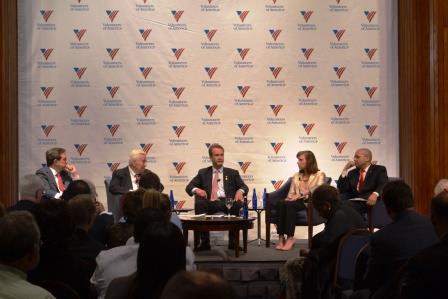July 2nd, 2013 by Bendure
I could go on and on about social media. Really, college students such as myself who spend ample time procrastinating (wait, I meant studying…) are perhaps some of the most avid social media mavens out there. From Facebook to Pinterest to Soundcloud to Twitter and all of the other offerings in between, social media takes up a good chunk of my free (and not so free) time, so I’d consider myself somewhat of an expert in the field, albeit self-proclaimed.
Yet over the past several weeks here at Bendure, I’ve come to realize more and more that social media is more than yet another vehicle for self-promotion or mindless entertainment – even if that’s all some of us mean to use it for. From a business standpoint, the use of social media can help to create a brand or image, and allows for more interactive communication with targeted audiences. In PR especially, social media is becoming the cornerstone of successful communications, contributing to the importance of staying on top of the latest developments and trends in the field (Vine versus Instagram video, anyone?). Even in politics, social media has come to play an integral role in the process, keeping the public both informed and engaged – just look at the 2012 election (Obama had 17.5 million Twitter followers at the time) or the social media frenzy surrounding recent Supreme Court decisions. The Wikipedia page on social media (don’t cringe – it’s far more reliable than it used to be, and Wiki is technically a social media site itself due to its collaborative nature, thus wholly appropriate for this post) actually gives quite a nice definition of this somewhat elusive term:
“Social media refers to the means of interactions among people in which they create, share, and exchange information and ideas in virtual communities and networks… It introduces substantial and pervasive changes to communication between organizations, communities, and individuals.”
The two concepts here that interest me the most are “virtual communities and networks” and “substantial and pervasive changes to communication.” In many ways, the rise of social media, or the “digital revolution” as some call it, has enabled the creation and mobilization of countless groups for activism, support, idea-sharing, and artistic exchange. Social media has become a vital tool to be used in advancing any cause, be it social, political, environmental, etc., through its ability to rally people together in these so-called “virtual communicates” that ultimately have the capacity to extend into real life.
Social media has also profoundly changed the ways in which we communicate with each other. While some may lament that the “disconnection” caused by over-investment in the alternative methods of communication provided by social media is damaging, I have to disagree (overall). While increasingly digitized communication may be emerging as a major means of interaction among young people these days, it’s not replacing face to face relationships, but rather supplementing them. What’s more, the new types of communications we’re seeing are becoming more and more instantaneous, accessible, and interactive thanks to the rapidly developing social media field, contributing to the “viral” trend as well as allowing for “posts” and “comments” on social media websites and apps to have far greater reach than other methods of communication. It’s hard to say whether this is necessarily a good or a bad thing, or perhaps some combination of both – but it’s absolutely important to recognize and understand, and it’s something that my time here at Bendure has helped me to see even more clearly. Whether the concept of social media interests you or not, one thing is for sure: social media is taking the business, political, artistic, and interpersonal worlds by storm. It’s not just for college kids anymore!
Grace Murphy is interning at Bendure Communications during the summer of 2013. She’ll occasionally be blogging about her time here, so check back to hear what she has to dish about her first intern experience. See her first post at http://www.bendurepr.com/the-internship/.
June 19th, 2013 by Bendure
Yesterday, we gathered with Volunteers of America for a panel discussion on veterans issues at the National Press Club. The panel members, former Senator Richard Lugar (R-Ind.), Koby Langley, Jonathan Sherin and Kelly Caffarelli, discussed issues facing many veterans returning from duty including Post Traumatic Stress Disorder (PTSD) and Traumatic Brain Injury (TBI). Koby Langley is a senior advisory with the Corporation for National and Community Service; Jonathan Sherin, M.D., PhD, is the executive vice president of veteran affairs for Volunteers of America, and an expert on PTSD, TBI, and other afflictions, and he works with a large number of returning vets. Kelly Caffarelli is president of The Home Depot Foundation, which has committed more than $80 million to help returning veterans. Fox’s Chris Wallace acted as the moderator.
Congressmen Phil Roe (R-Tenn.) and Tim Walz (D-Minn.) opened the discussion, speaking about their work on the Veterans Affairs Committee on Capitol Hill. Roe is one of the founders of the bi-partisan Invisible Wounds Caucus, and Walz is a participant. They went on FOX 5 Morning News before the panel to also discuss their work.
Here are some remarks from the panel.
- Wallace asked the panelists if they had a magic wand and could make one thing happen for veterans, what would it be? Caffarelli said she would make sure that all veterans had homes.
- Sherin, on the state of mental health of veterans: “This is a national emergency, but also a national opportunity.” He spoke to the fact that every sector had to join together to help: government, media, non profits, etc.
- Langley discussed the fact that unlike other wars, this war has produced women veterans, who he believes can serve as civic leaders. “This is something we’ve not experienced before,” he said.
- In closing remarks, Lugar said, “I think there is bipartisanship on this issue and that needs to be maintained.”
At the end, the audience was invited to ask the panelists questions. Here are some comments from that part of the discussion.
- Caffarelli, “We do talk about the problems a lot. Thirty percent of returning veterans have PTSD. That means there are 70% without.” She pointed out both Lugar and Langley had served, and they were examples of how veterans can be successful after service.
- Langley echoed Sherin’s sentiment on a collaborative effort to help end this, suggesting ways the community can help as donating capital and community service.
- Caffarelli suggested that philanthropy plays a leader role in getting more local support for veterans. “Getting local VAs, mayors offices and local resources together. Philanthropy can help start that conversation.”
- Langley responded to a question from the audience regarding a change in the chain of command relating to sexual assaults in the military on women. How many sexual assaults are acceptable in the military? “Zero,” he voiced.

